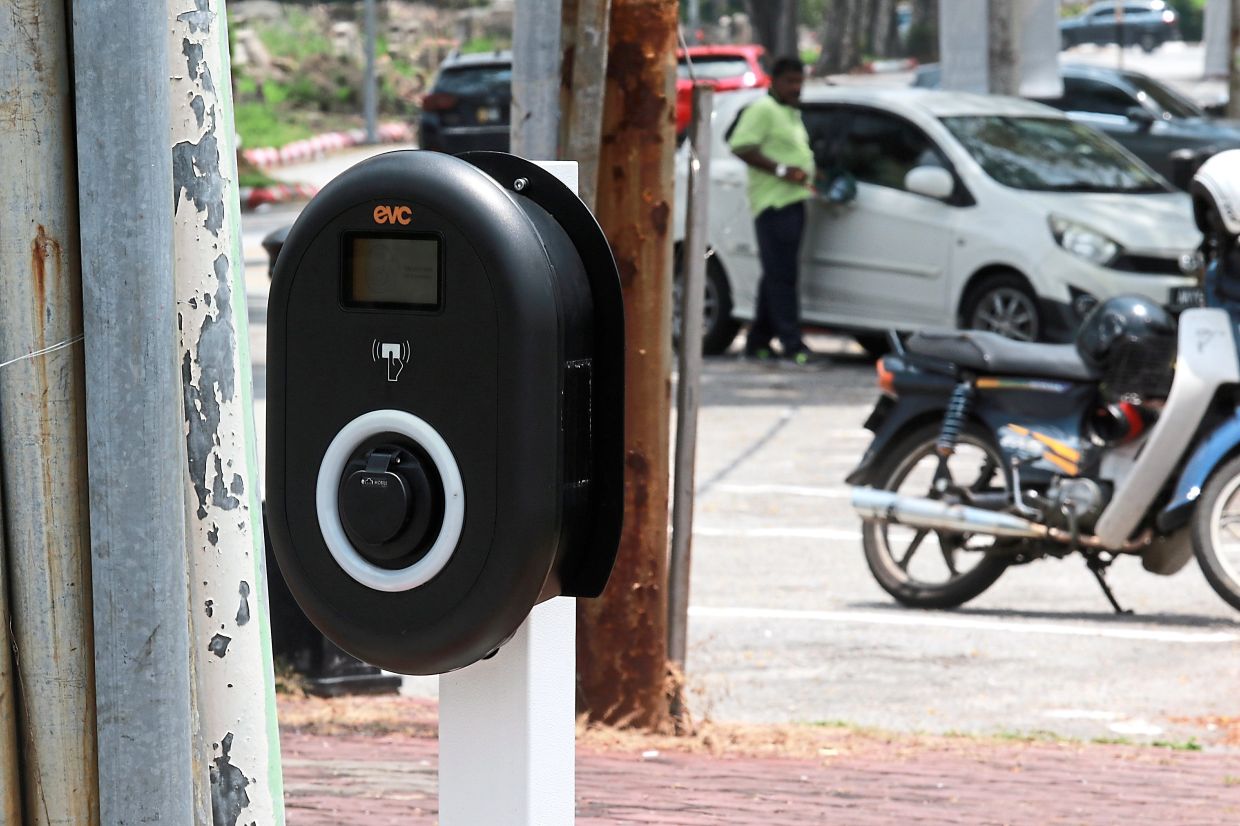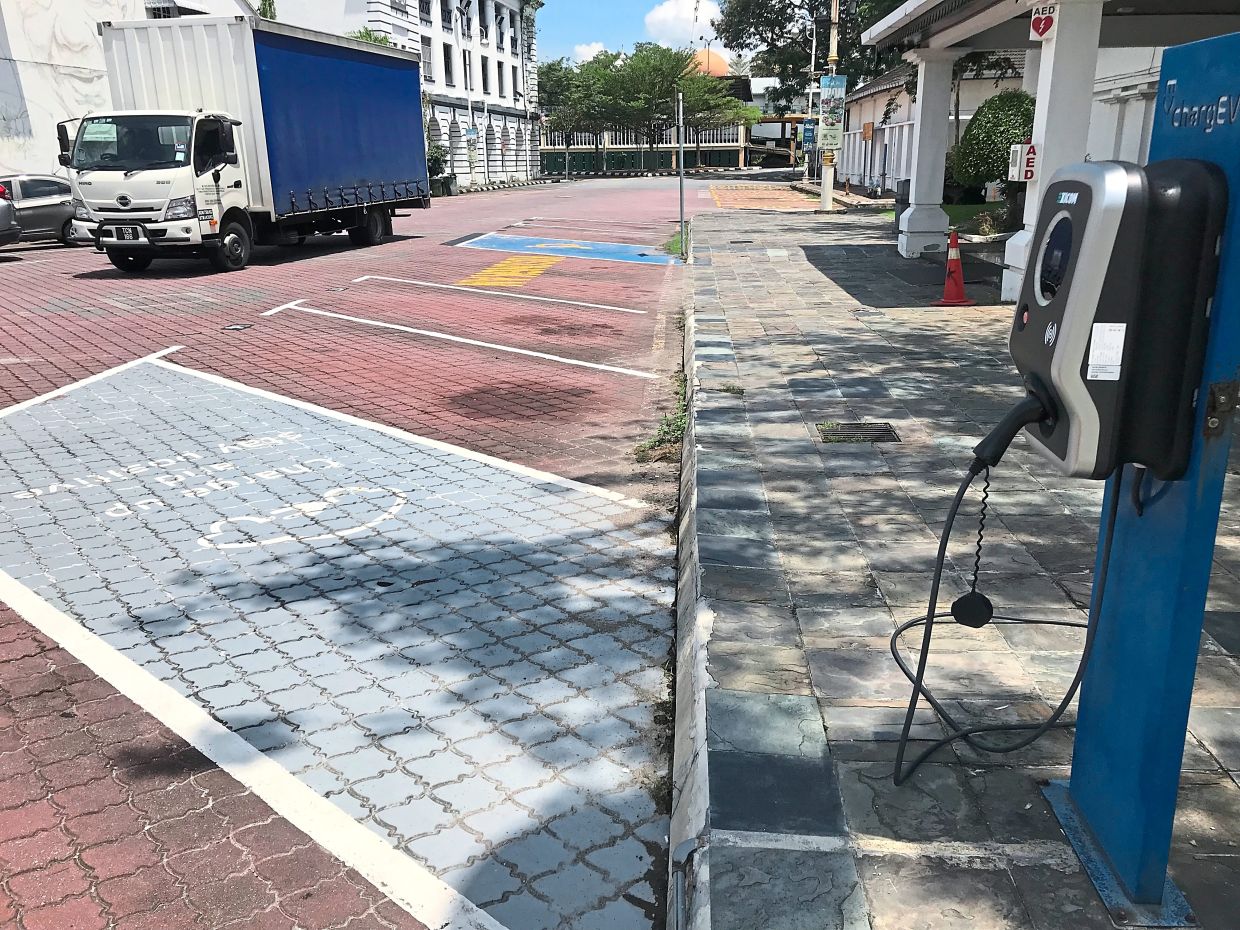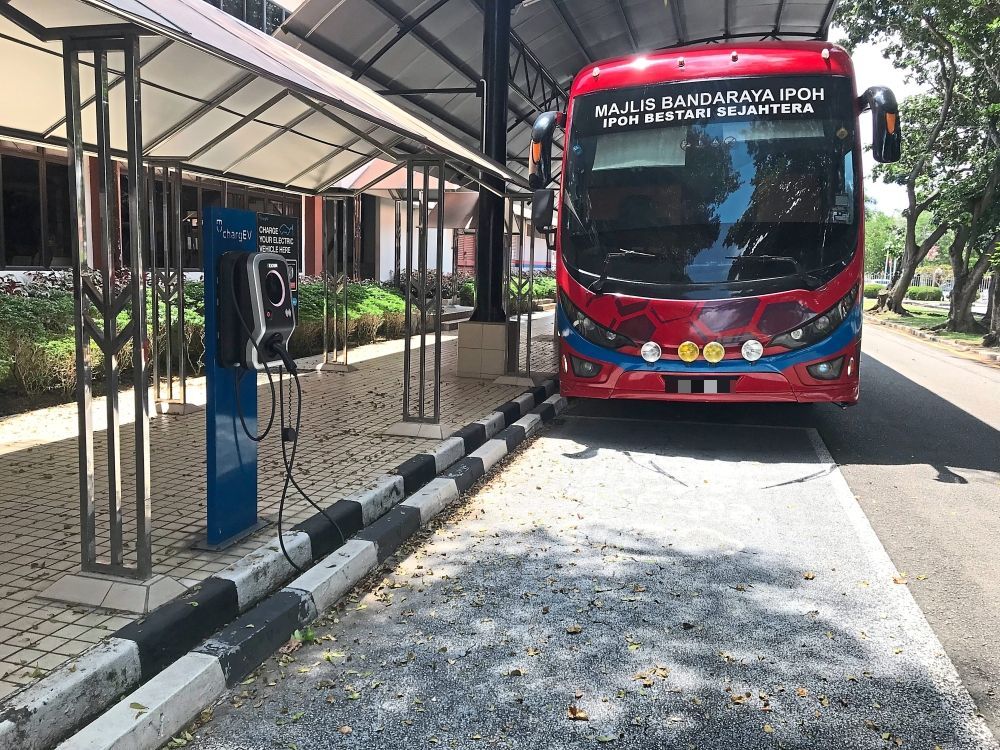Some electric car charging stations are also set up privately such as this one at a hotel in Ipoh for the convenience of its guests. — Photos: RONNIE CHIN/The Star
Ipoh folk think twice about switch to electric vehicles due to doubts about facilities, cost and charging time
Ipoh City Council (MBI) has set up several electric vehicle (EV) charging stations throughout the city as it prepares to welcome more people to use such vehicles.
The move is also in line with the Federal Government’s call to encourage more people to opt for the more environmental-friendly type of vehicle.
Ipoh mayor Datuk Rumaizi Baharin said the charging stations had been set up at four locations, namely at the D.R. Seenivasagam Park, Sultan Abdul Aziz Recreational Park, the Ipoh Tourist Information Centre and at the MBI headquarters.
“No fees are imposed on motorists needing to charge their electric cars at these four locations.
“The charging stations are a necessity for electric cars, even though the number of such vehicles is still low in the city,” he told StarMetro.The low number of electric vehicles on Ipoh roads has made these charging stations currently underutilised.
“We expect the number of electric vehicles to increase in the future and these stations will then be fully utilised, as it is the Federal Government’s policy to encourage more people to drive EV,” said Rumaizi.
He said that another charging station was set up by a private company at the Perak Urban Transformation Centre carpark.
He also said that MBI had bought a hybrid car to be used by its officers.
“We want to lead by example and to encourage the people to consider getting an EV in the future,” he said, disclosing that the car was expected to arrive soon.
“We are also looking to buy electric motorcycles to be used by our staff. We will buy these if there are suitable models that meet our requirements and budget,” he added.
According to a recent report, Investment, Trade and Industry Ministry (Miti) noted that there are 900 EV charging points nationwide, and it is expected to number about 4,000 charging stations this year.
Minister Tengku Datuk Seri Zafrul Abdul Aziz had also noted that the government aimed to provide 10,000 public charging facilities, comprising 9,000 units of alternate current type and 1,000 units of direct current type, by 2025.
According to Malaysian Automotive Association (MAA), a total of 2,631 EVs were sold in the country last year, while Road Transport Department director-general Datuk Zailani Hashim said there were about 10,000 registered EVs in Malaysia.
Charging station issue
Bank officer Michael Chang, 42, said the lack of the necessary infrastructure was one reason why there were not many EVs on the road in Ipoh.
“Compared to Kuala Lumpur, the charging stations in Ipoh are considered to be lacking.
“But even with a handful of these facilities, we are on the right path towards the usage of EV. However, more facilities would be required to support and promote the use of these vehicles,” he said.
The lack of the facilities, including in rural areas, he said, would make people think twice about getting an EV presently, even though he believed many people would want to own such a vehicle.
“People are more environmentally-conscious now and I strongly believe that everyone wants to do their part to save the planet.
“But among the things people will think about is what if they run out of battery and get stuck in some place,” said Chang.
“Another important factor when considering buying an EV is still the price.
“If these vehicles are affordable and cost effective when compared to a conventional fuel-based vehicle, then I believe more people will buy it,” he added.
Company director Dominic Loh, 36, questioned whether the charging stations set up by MBI were functioning.
Loh, who is currently driving a plug-in hybrid car, said he rarely saw people using the facilities.
“I hope these stations can be used and are not merely a shell.
“Being in a public location, I do fear that the electrical stuff or cables of these machines may get stolen,” he added.
One problem faced by EV or hybrid car drivers was the waiting time to charge their vehicles at public charging stations, said Loh.
“There are selected petrol stations in the city that offer these charging facilities. And if there are four cars waiting in line, then it becomes an inconvenience.
“Each car would take at least 30 minutes up to a few hours to recharge their battery,” he said.
He believes that the best locations to have charging stations are at shopping centres and hotels.
“As people will often stay for long hours at these locations, they are suitable to offer the facilities,” he said.
“We hope to see more and better facilities for EV in the future,” he added.
Benefits of EV
Loh is of the view that EV is the way forward for all.
“It is a good way to save the environment and it is certainly the in-thing now.
“My advice for folk who want to own one is to go for the lower-end EV rather than the high-end ones,” he said, adding that there were quite a number of EV models available in Malaysia.
At present, there are about 20 models of electric cars available in the country.
These include low-end models from Great Wall Motor or BYD to high-end models from BMW, Volvo and Porsche.
The prices range between RM130,000 and RM966,000 depending on the make and specifications.
In the revised Budget 2023 tabled in February, duty exemptions for fully imported and locally-assembled EVs had been extended until the end of 2025 and 2027 respectively.
Import tax exemption for components used in local assembly of EVs were extended by two years until the end of 2027.
Sales executive Eric Lim, 45, said people could opt to test out hybrid cars before going full electric.
“I have been driving one since December and it has been good so far.
“I mainly use it in the city and I have not needed to charge my car outside of my home so far,” he said.
“A full six-hour charge at home can give me up to 60km in mileage and when my car is low on battery, I can still use petrol,” he added.
Lim said he would only consider switching to an EV about two to three years later, given the lack of public charging stations in the country now.
“It is still a concern, especially if I need to travel to an outstation location.
“If it coincided with a public holiday, my time would be wasted as I could get stuck at the rest lay-by for at least 30 minutes to an hour,” he said.
“I read an article online that a driver of a particular luxury EV car spent about RM200 to charge his vehicle four times for a round trip between Kuala Lumpur and Penang,” he added.
Management consultant Dharmik Sheth, 35, from Kuala Lumpur, said there were a lot of shopping malls and hotels in the capital and Penang with EV charging stations.
“I travel a lot so it is good that these locations have the services.
“Some places in Kuala Lumpur charge RM2 for 15mins of usage and some RM8 for an hour,” he said, adding that it took about two hours for a full charge at public charging stations.
“At home it will take me about four hours for a full charge, which allows me to drive up to 40km,” he said, adding that he also felt it cheaper to charge at home.
Some online reports have indicated that the cost of charging an electric car at home ranged between RM15 and RM70, depending on the vehicle’s battery capacity, while it could cost twice the amount to charge at public locations.











